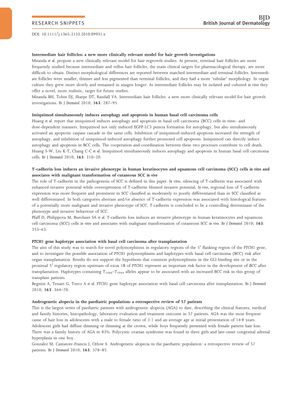Research Snippets from the British Journal of Dermatology: Studies on Hair Growth and Skin Conditions
July 2010
in “
British Journal of Dermatology
”
hair regrowth intermediate hair follicles terminal follicles imiquimod autophagy apoptosis basal cell carcinoma T-cadherin keratinocytes squamous cell carcinoma malignant transformation PTCH1 gene androgenetic alopecia polycystic ovarian syndrome congenital adrenal hyperplasia hair growth BCC SCC AGA PCOS CAH

TLDR New hair regrowth model proposed, imiquimod found to kill skin cancer cells, T-cadherin loss linked to invasive skin cancer, no clear gene link to skin cancer after transplant, and study on children's hair loss shows male dominance and genetic ties.
In a series of research snippets from the British Journal of Dermatology dated July 21, 2010, several studies on hair growth and skin conditions were summarized. Miranda et al. introduced a new model for hair regrowth studies focusing on intermediate hair follicles, which are more clinically relevant than terminal follicles and offer a novel target for future research. Huang et al. found that imiquimod induces both autophagy and apoptosis in basal cell carcinoma (BCC) cells, suggesting a cooperative role in cell death. Pfaff et al. demonstrated that loss of T-cadherin in keratinocytes and squamous cell carcinoma (SCC) cells leads to an invasive phenotype and is associated with malignant transformation in cutaneous SCC. Begnini et al. did not find a significant association between common polymorphisms in the PTCH1 gene and BCC risk after organ transplantation, although certain haplotypes may increase risk. Lastly, Gonzalez et al. provided the largest retrospective review of pediatric androgenetic alopecia to date, with 57 patients showing a male to female ratio of 2:1, a strong family history of the condition, and associated conditions like polycystic ovarian syndrome and congenital adrenal hyperplasia in some cases.




